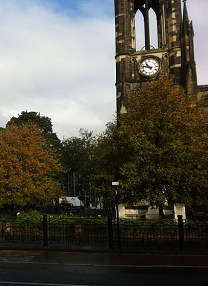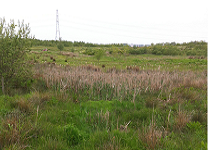What is a Blue-Green City?
A Blue-Green City aims to recreate a naturally-oriented water cycle while contributing to the amenity of the city by bringing water management and green infrastructure together.
This is achieved by combining and protecting the hydrological and ecological values of the urban landscape while providing resilient and adaptive measures to deal with flood events.
Blue-Green Cities generate a multitude of environmental, ecological, socio-cultural and economic benefits.
What is a Blue-Green City? Read our detailed definition.
Read more about our Research.
Meet the Blue-Green Cities Research Team
Blue-Green Cities is an interdisciplinary research project led by Colin Thorne, University of Nottingham.
Learn more about the Blue-Green Cities Research Team.
Example publications
Allen D, Haynes H, Arthur S. Contamination of Detained Sediment in Sustainable Urban Drainage Systems. Water, 2017, 9(5), 355 - 274. DOI: 10.3390/w9050355.
O’Donnell E, Woodhouse R, Thorne C. Evaluating the multiple benefits of a Newcastle surface water management scheme. Proceedings of the ICE – Water Management, 2017. DOI: 10.1680/jwama.16.00103.
Everett G, Morzillo A, Lamond J, Matsler M, Chan F. Delivering Green Streets: An exploration of changing perceptions and behaviours over time around bioswales in Portland, Oregon. Journal of Flood Risk Management, 2015. Access article here.
See more publications by the Blue-Green Cities Research team.
2014 UK-US collaboration
Clean Water for All Research Project (CWFA)
Portland, May 2014: combining research expertise of the Blue-Green Cities and Portland-Vancouver ULTRA (Urban Long-term Research Area) Projects.
CWFA dissemination: this research was presented at the Urban Water and Flood Risk Management: The Blue-Green Advantage. A China-UK-US Knowledge Exchange Workshop, June 2015, Ningbo China.
Blue-Green Cities end of project dissemination event Feb 2016
On the 18th February 2016, the Blue-Green Cities Research Consortium and partners from the project demonstration city, Newcastle UK, hosted an event to disseminate research findings, showcase influential speakers and discuss how a Blue-Green vision for improved flood resilience might progress.
Keynote speakers included:
- Cllr Ged Bell, Cabinet Member for Investment and Development
- Richard Warneford, Waste Water Director, Northumbrian Water
- Marie Fallon, Area Manager – North East, Environment Agency
- Colin Thorne, BGC lead, University of Nottingham
- Chris Kilsby and Clare Rogers, Newcastle University
- Mary Dhonau, Chair of the Flood Protection Group for the Property Care Association, CEO of the ‘Know Your Flood Risk’ campaign
Read more about the event and download the associated documents.
2015 demonstration case study: Newcastle
In 2015, the Blue-Green Cities team focussed their research on Newcastle, UK, and the assessment and evaluation of the multiple benefits of different flood risk management strategies in the urban core and middle Ouseburn catchment. Read more ( WP5).
Find out about the Newcastle Learning and Action Alliance (LAA)

